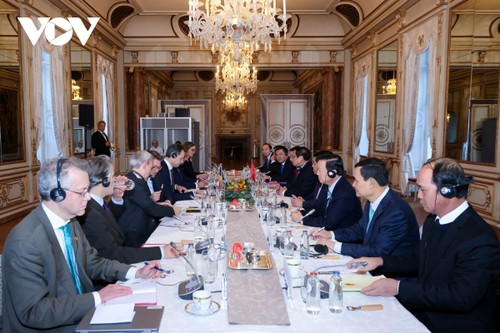 |
Speaking at the talks, which took place following a welcome ceremony for the Vietnamese leader at Egmont Palace the same day, Croo stressed that Chinh’s visit is of great significance as it contributes to taking the bilateral relationship into a new development period and making it more intensive, practical and effective, especially in trade and investment.
The host PM affirmed that Belgium attaches importance to Vietnam’s role and position in Asia-Pacific.
The two spoke of the socio-economic situation in each country, the bilateral collaboration and regional and international issues of shared concern in a candid manner.
They rejoiced at positive developments of the bilateral relations despite impacts of the COVID-19 pandemic, with regular contact and thriving trade-investment ties, saying many Belgian projects are operating successfully in the Southeast Asian nation.
Chinh used the occasion to thank the Belgian government and people for their donation of COVID-19 vaccines, helping Vietnam push back the pandemic, reopen its doors, and recover the national economy.
The PMs agreed on major orientations and measures to foster the comprehensive cooperation between the two countries, especially to deepen the collaboration within the framework of the strategic partnership in agriculture.
The two countries will also step up cooperation in investment and trade as well as other potential spheres, increase the exchange of all-level delegations, and further materialise bilateral cooperation mechanisms effectively.
Chinh invited his Belgian counterpart to visit Vietnam in 2023 when the two countries celebrate the 50th anniversary of the bilateral diplomatic ties.
In terms of trade and investment, the two sides pledged to encourage their agencies and businesses to continue fully and effectively implementing the EU-Vietnam Free Trade Agreement (EVFTA).
Chinh urged Belgium to soon ratify the EU-Vietnam Investment Protection Agreement (EVIPA), encourage Belgian firms to invest in Vietnam in such areas as digital transformation, renewable energy, logistics, seaport and strategic infrastructure, and support the European Commission (EC) to remove its “yellow card” on Vietnamese fisheries.
Host and guest highlighted the positive outcomes after five years implementing the strategic partnership in agriculture.
Chinh suggested Belgium assist Vietnam in circular agriculture-based economy and smart agriculture, along with the prevention and control of saltwater intrusion and drought in the Mekong Delta.
He also called for Belgium’s support in the realisation of the national strategy on green growth for 2021-2030, towards sustainable, environmentally-friendly development.
The two countries will promote the trilateral cooperation mechanism with African countries, with Belgium’s financial and logistics assistance, to cope with issues regarding food security in the world.
The Belgian side suggested establishing a working group to soon launch specific cooperation projects in agriculture.
The two sides consented to expand cooperation in defence-security, education-training, and culture, with the organisation of cultural days in each country to boost people-to-people exchange, while bolstering coordination in handling global challenges.
In climate change response, the Belgian PM expressed his willingness to help Vietnam with finance and technology to fulfill its international climate commitments, especially renewable energy technology and support industries.
The PMs also exchanged views on regional and international issues of shared concern, and pledged to continue their close coordination and mutual support at multilateral forums and international organisations as both countries are members of the United Nations Human Rights Council for 2023-2025, thus contributing to ensuring peace, security, cooperation and development in the region and the world at large.
On the East Sea issue, the two sides reiterated the importance of ensuring peace, stability, security, safety and freedom of navigation and aviation in the East Sea, and voiced their support for the respect of law, neither using nor threatening to use force, and settling disputes through peaceful measures in line with international law, particularly the 1982 United Nations Convention on the Law of the Sea (UNCLOS).
Following their talks, the PMs witnessed the signing of several cooperation agreements between ministries, agencies, localities and businesses of the two countries in the fields of agriculture, green marine economy and food safety, among others.